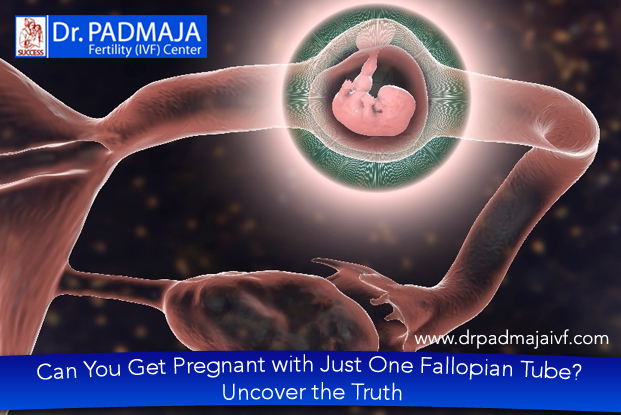When it comes to fertility and conception, the role of the fallopian tubes is often at the forefront of the conversation. The question, “Can you get pregnant with just one fallopian tube?” is one that many women face, especially if they’ve experienced a tubal surgery, ectopic pregnancy, or other medical conditions affecting their reproductive system. But the answer isn’t just a yes or no; it depends on a lot of different things. Understanding the Job of Fallopian Tubes The fallopian tubes are fundamental regenerative organs that associate the ovaries to the uterus. During ovulation, an egg is let out of the ovary and goes through the fallopian tube toward the uterus. It is in this tube that treatment by sperm normally happens.
With only one fallopian tube, it’s natural to wonder how this might impact your ability to conceive.
Can You Conceive with One Fallopian Tube
Yes, you can still conceive with just one fallopian tube. However, the success rate depends on several factors. These include the health of the remaining tube, the functionality of the ovaries, and the overall reproductive health of the woman. If the remaining tube is healthy and unobstructed, and ovulation occurs from the ovary on the same side as the functioning tube, conception is certainly possible.
Factors That Influence Pregnancy with One Fallopian Tube
- Health of the Remaining Fallopian Tube: If the remaining tube is healthy and free from scarring or blockage, it can still transport the egg for fertilization.
- Ovulation: Women with one fallopian tube can ovulate normally. If ovulation occurs on the side where the tube is present, the chances of conceiving are similar to those with two tubes.
- Ovarian Health: The condition of your ovaries is critical. If both ovaries are healthy, they can produce eggs, and if one tube is functional, the chances of pregnancy remain viable.
- Overall Reproductive Health: Hormonal balance, uterine health, and overall well-being also play significant roles in conception. Regular check-ups with a fertility specialist can help ensure these factors are optimal.
The Impact of Surgery on Fallopian Tube Health
Surgical removal of a fallopian tube, known as salpingectomy, is often necessary due to conditions such as ectopic pregnancy, severe infections, or endometriosis. While this may reduce your chances of conceiving naturally, it doesn’t eliminate them. The body has a remarkable ability to adapt, and many women have successfully conceived after a salpingectomy.
How IVF Can Help Women with One Fallopian Tube
In vitro fertilization (IVF) is an excellent option for women who face difficulties conceiving naturally due to having only one fallopian tube. Dr. Padmaja IVF Center in Hyderabad is a leading fertility clinic that specializes in helping women with various reproductive challenges, including those with a single fallopian tube.
IVF bypasses the fallopian tubes altogether by fertilizing the egg in a laboratory setting and then implanting the embryo directly into the uterus. This method is particularly beneficial for women whose remaining tube may not be functioning optimally. At Dr. Padmaja IVF Center, you’ll receive personalized care and a comprehensive treatment plan tailored to your specific needs.
Success Rates of IVF for Women with One Fallopian Tube
The success rate of IVF for women with one fallopian tube is generally promising, especially when treated at top-tier facilities like the Dr. Padmaja Fertility Center. The success rates can vary based on factors such as age, ovarian reserve, and the overall health of the uterus and ovaries.
Natural Conception Tips for Women with One Fallopian Tube
If you’re aiming to conceive naturally with one fallopian tube, here are some tips to maximize your chances:
- Track Your Ovulation: Use ovulation prediction kits or track your basal body temperature to determine when you’re ovulating. This helps you time intercourse for your most fertile days.
- Maintain a Healthy Lifestyle: A balanced diet, regular exercise, and avoiding smoking and excessive alcohol can improve your overall reproductive health.
- Consult a Fertility Specialist: Regular check-ups at a fertility center can help monitor your reproductive health and address any issues that may arise.
Emotional and Psychological Considerations
Facing fertility challenges can be emotionally taxing. It’s essential to have a strong support system, whether it’s through friends, family, or a professional counselor. Remember, you’re not alone, and many women have gone through similar experiences and successfully conceived.
When to Seek Help from a Fertility Specialist
If you’ve been trying to conceive for over a year (or six months if you’re over 35), it might be time to seek help from a fertility specialist. Dr. Padmaja IVF Center in Hyderabad offers a range of services to assist women in their fertility journey. The clinic’s team of experienced professionals will work with you to identify any issues and recommend the best course of action.
Conclusion
In conclusion, having one fallopian tube doesn’t mean that you can’t conceive. While it may present some challenges, many women have successfully achieved pregnancy with just one tube, whether naturally or through assisted reproductive techniques like IVF. With the right care and support from specialists at places like Dr. Padmaja IVF Center in Hyderabad, your dream of becoming a parent is very much within reach. Remember, staying informed, maintaining a healthy lifestyle, and seeking professional guidance are key steps in your fertility journey.
About The Author :

If Dr. Padmaja Divakar is a public figure or a professional in a specific field, I recommend checking her official website, professional profiles, or reliable online sources for the most up-to-date and accurate information about her background, qualifications, and achievements.
Frequently Asked Questions (faqs)
Can you ovulate with one fallopian tube?
Yes, women with one fallopian tube can still ovulate regularly. If the remaining tube is healthy, it can capture the egg and allow for fertilization.
Does having one fallopian tube reduce fertility?
Fertility may be slightly reduced but not entirely eliminated. If the single fallopian tube is functioning normally and there are no other fertility issues, pregnancy is still possible.
What causes someone to have only one fallopian tube?
Some common reasons include prior surgery (like ectopic pregnancy removal), birth defects, or infections that may have damaged one of the tubes.
Can you undergo IVF with only one fallopian tube?
Yes, IVF (In Vitro Fertilization) bypasses the fallopian tubes entirely. It can be a suitable option for women with only one or no fallopian tubes.
How long should I try to conceive naturally with one fallopian tube before seeking help?
If you’re under 35, trying naturally for up to a year is generally recommended. If you’re over 35, you should seek help after 6 months of trying.

